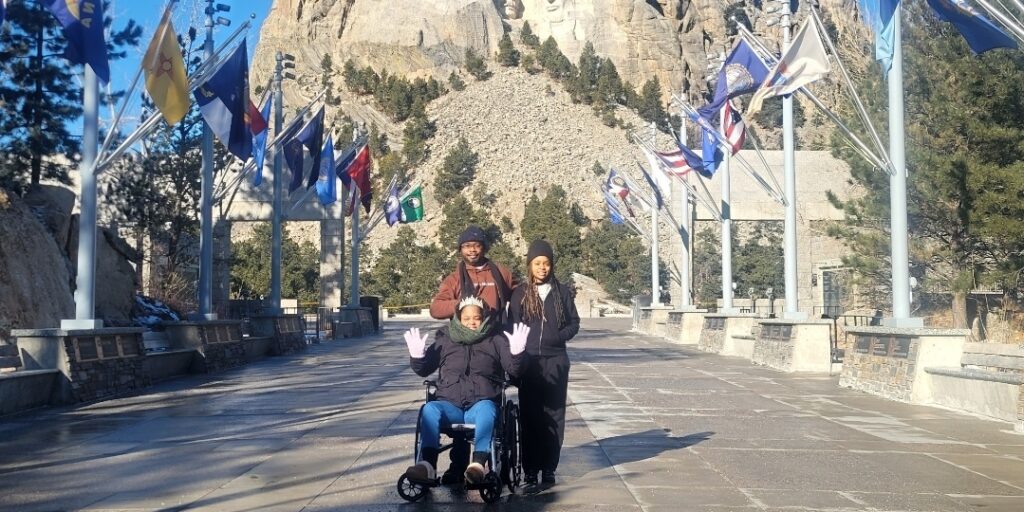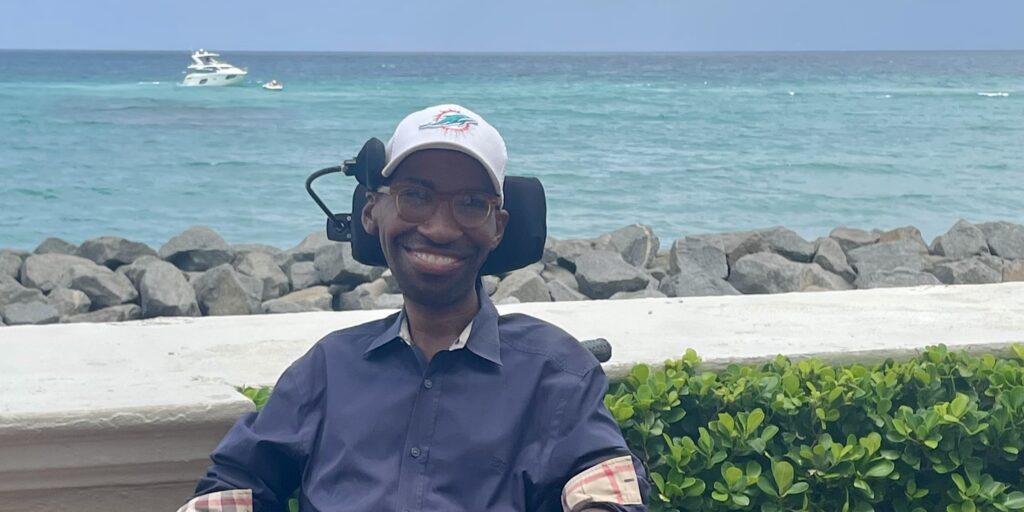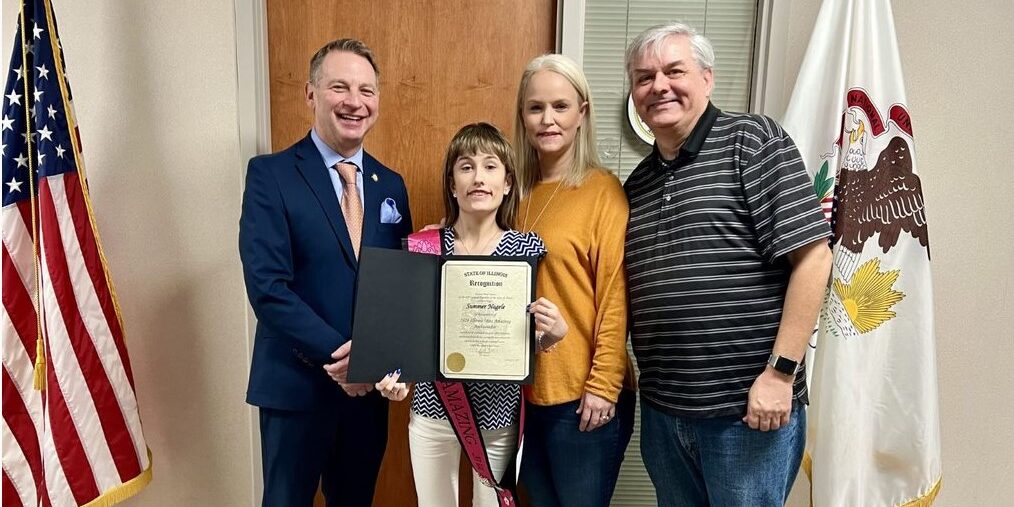
Special Olympic Silver-Medalist Shines Bright in Her Community
By Rebecca Hume | Friday, April 26, 2024
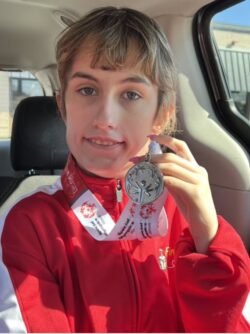
Summer Nagele with one of her many Special Olympics medals.
Summer Nagele is intent on sharing her gifts and talents with the world. The 19-year-old activist, advocate, and athlete has competed in more than 60 Special Olympic events, showcasing her skills in basketball, soccer, track and field, bocce ball, unified bags (also known as cornhole or beanbag toss), softball, golf, volleyball, and gymnastics. Following her recent silver medal victory in basketball skills at the Special Olympics State Competition in Illinois, Summer is continuing her journey raising awareness and funds for the rare disease community and embarking on a new quest as a Special Olympics athlete leader and spokesperson.
A passion for competition and camaraderie
Summer, who lives with KCNK9 Imprinting Syndrome, was initially diagnosed with congenital myasthenic syndrome and receives care through Nationwide Children’s Hospital MDA Care Center. She first discovered her love for competing in the Special Olympics when she was nine years old. At that time, Summer’s main motivation to join the team was to spend more time with her friends and get involved in sports that would be accessible to her. She found the opportunity for both competing on her local Special Olympian bocce ball team with her two best friends.
“I wasn’t really that into bocce ball, but I wanted to do it with my friends so that we could spend time together at practices and competitions and then celebrate together after,” Summer says. “At first, it was the social appeal that drew me in, but then I caught the competition bug. I won my first gold medal in bocce ball and wanted to keep winning them.” She has since won more than 100 medals in Special Olympic events over the last ten years.
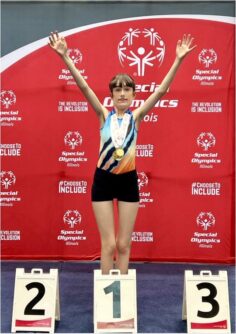
Summer celebrating victory at the Special Olympics.
To prepare for competition events, the Special Olympic team has weekly practices and Summer also practices at home as often as she can. Because her muscles fatigue quickly, it can be difficult to do repetitive movements for a long time. In order to combat fatigue, she often practices multiple times a day in short intervals. When she experiences increased fatigue, she uses a power wheelchair or takes breaks to sit down. Summer has learned to listen to her body and play adaptively, choosing events that best suit her energy levels and abilities. This year was the first year that she had the opportunity to compete in basketball skills, a sport she has loved since she was a small child.
“It was very hard for me to shoot a ball at first because I don’t have a lot of muscle tone in my arms and legs,” she says. “I started with a small kids hoop and worked my way up to the hoop in my driveway. I missed a lot of shots early on, but I never gave up. Year after year, I got better and better because of hours and hours of practice. I decided this year to include basketball skills to my list of Special Olympic sports in which I compete.”
Summer received a gold medal at the regional competition and went on to earn a silver medal at the state level. In addition to the joy of spending time with friends, competing, and (often) winning, Summer has learned a lot from her experiences on the Special Olympic team. “Special Olympics taught me about different sports, helped me understand how to have good sportsmanship, and how to push myself to do my best every time I participated,” she says. This year, she is pushing herself even further by accepting a role as an athlete spokesperson and mentor.
As part of the Athlete Leadership Program, Summer is supporting her peers, promoting Special Olympics and recruiting volunteers through speaking events and television segments, and presenting at local high schools to thank them for fundraising and share why it is important – accomplishments that she can add to her already long list of advocacy endeavors.
Advocacy, encouragement, and a voice for others
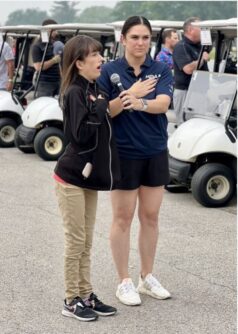
Summer performing at an MDA Golf Event.
Summer and her family have been active in their community, raising awareness and advocating for causes close to their hearts, for more than a decade. Autumn Nagele, Summer’s mother, lives with limb girdle muscular dystrophy (LGMD) type 2L and shares her daughter’s passion for making a difference in the lives of others.
“Advocacy is important because it creates a genuine connection with people,” Autumn says. “By raising awareness through advocacy and creating a connection with others, an opportunity is created to give of themselves by supporting us and others in whatever way they are able.”
Summer, who started advocating when she was 8 years old, says that she wants to be a voice for people with disabilities. She has advocated for several organizations in addition to the Special Olympics, including Miss Amazing, Shriners Hospital for Children, Nationwide Children’s Hospital, KCNK9 Imprinting Syndrome groups, LGMD groups, and MDA. Summer, a previous MDA Ambassador, has volunteered her time and talents at a multitude of MDA events. She has participated in Fill-the-Boot events, Shamrocks campaigns, bowling events, galas, golf outings, and has performed the national anthem in front of thousands at multiple large events. One event near and dear to Summer and her family is an incredible annual fundraiser that they co-founded to help send youth to MDA Summer Camp.
In 2014, the Nageles teamed up with another family whose son lives with Duchenne muscular dystrophy (DMD) and the owner of a local family-friendly pub to create a now-popular annual event known as the
Bunny’s Bash for MDA. What started as a designated day at Bunny’s Tavern where proceeds of a St. Pat’s plate were donated to MDA Summer Camp, has since grown to become one of the community’s favorite events, raising $52,000 in 2019. Partnering with local business donors, the fire department, friends, and neighbors, the event offers a space for community members to gather and have fun while raising awareness about neuromuscular disease and increasing opportunities for youth to attend camp.
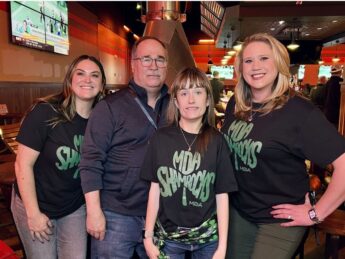
MDA’s Amanda Konopka, Vice President of GM Citgo Lemont Refinery Jim Cristman, Summer, and Citgo’s Jen Hannon (left to right) at an MDA fundraiser.
One of the many reasons that the event has become so successful and has continued to grow over the years is due in part to the incredible following that Summer has amassed on social media. “Summer’s Soldiers”, a Facebook page with over 1000 followers, chronicles Summer’s journey living with a rare disease and serves as a powerful medium to raise awareness and advocate for MDA and other valuable organizations. The Nageles started the page as a means to update friends and family on Summer’s medical and diagnostic journey, but it has since become a vehicle of encouragement, inclusion, and advocacy.
For Summer, her following and her accomplishments are an opportunity to remind others of their own power and capabilities. “I want to tell others that they can get out there and try something new, because you never know what you are capable of until you try,” she says. “My parents taught me to live my life to the fullest and they helped me in any way that they could. This included encouraging me to try new things. So, I live a limitless life – and if I fail, that’s okay, too. Because failure has taught me to become an even stronger person.” Summer hopes that her story, passion, and advocacy efforts can offer that same level of encouragement to others – and remind them to keep shooting for the stars.
Next Steps and Useful Resources
- Stay up-to-date on Quest content! Subscribe to Quest Magazine and Newsletter.
TAGS: Community, Fundraising, Staying Active, Young Adults
TYPE: Blog Post
Disclaimer: No content on this site should ever be used as a substitute for direct medical advice from your doctor or other qualified clinician.


